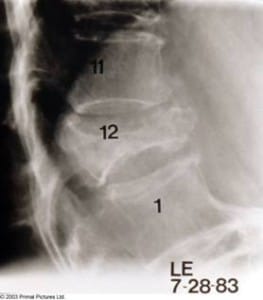COMPRESSION FRACTURES
Compression fractures are common fractures found in both the thoracic and lumbar spine and result from trauma involving a combination of compression and flexion. In the elderly, osteoporosis is a frequent contributing factor to the development of these wedge-shaped fractures – and these so called “grandma fractures” can also occur spontaneously during everyday activities such as coughing or sneezing.
Osteoporosis is a metabolic bone disorder characterised by decreased amounts of normal quality bone resulting in an increased susceptibility to fracture. Although most commonly found in post-menopausal females, it can also be secondary to immobilisation, as well as a number of underlying conditions, e.g. steroid use, alcoholism and malignancy.

© 2003 Primal Pictures Ltd.
Osteoporosis may result in vertebral compression, which can be acutely painful or pass unnoticed by the patient. Wedging usually affects the upper end-plate more than the lower, so that the difference in height between the front and back of the normally rectangular shaped vertebrae is greater than 2mm.
Symptoms which may be associated with compression fractures are:
• Sudden, severe back pain.
• Worsening of pain when standing or walking.
• Some pain relief when lying down.
• Difficulty and pain when bending or twisting.
• Loss of height.
• Deformity of the spine – the curved, “hunchback” shape.
Following imaging to confirm the presence of a compression fracture, it is necessary to establish the cause of this injury. If indeed the fracture occurred following a minor amount of trauma, it is necessary to work out if these is any underlying cause for the reduction in bone density within the spine. One way to ascertain bone density levels is through a bone density scan.
(The list of conditions given above and subsequent explanations are intended as a general guide and should not be considered a replacement for a full medical examination. Furthermore, we do not purport to treat all the conditions listed. Should you wish to discuss any of these conditions with our chiropractors, please do not hesitate to phone the clinic on 020 7374 2272 or email enquiries@body-motion.co.uk).
Our team of chiropractors and massage therapists are on hand to answer any questions you may have, so get in touch today via enquiries@body-motion.co.uk or on +44 (0)20 7374 2272.
